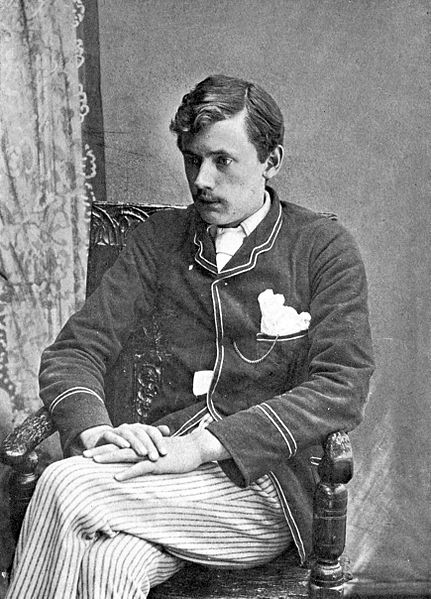<Back to Index>
- Physician and Humanist Scholar Theodor Zwinger the Elder, 1533
- Writer Ernest Christopher Dowson, 1867
- President of Venezuela Rómulo Ángel del Monte Carmelo Gallegos Freire, 1884
PAGE SPONSOR


Ernest Christopher Dowson (2 August 1867 – 23 February 1900), born in Lee, London, was an English poet, novelist and writer of short stories, associated with the Decadent movement.
Dowson attended The Queen's College, Oxford, but left before obtaining a degree. In November 1888, he started work with his father at Dowson and Son, a dry - docking business in Limehouse, east London, established by the poet's grandfather. He led an active social life, carousing with medical students and law pupils, going to music halls, and taking the performers to dinner. Meanwhile, he was also working assiduously at his writing. He was a member of the Rhymers' Club, which included W.B. Yeats and Lionel Johnson. He was also a frequent contributor to the literary magazines The Yellow Book and The Savoy. Dowson collaborated on two unsuccessful novels with Arthur Moore, worked on a novel of his own, Madame de Viole, and wrote reviews for The Critic.
In 1889, at the age of twenty - three, Dowson fell in love with eleven year old Adelaide "Missie" Foltinowicz, the daughter of a Polish restaurant owner. Adelaide is reputed to be the subject of one his best known poems, Non Sum Qualis eram Bonae Sub Regno Cynarae. He pursued her unsuccessfully; in 1897, she married a tailor who lodged above her father's restaurant and Dowson was crushed. In August, 1894, Dowson's father, who was in the advanced stages of tuberculosis, died of an overdose of chloral hydrate. His mother, who was also consumptive, hanged herself in February, 1895, and soon Dowson began to decline rapidly.
Robert Sherard one day found Dowson almost penniless in a wine bar and took him back to the cottage in Catford where he was himself living. Dowson spent the last six weeks of his life at Sherard's cottage and died there of alcoholism at the age of 32. He is buried in the Roman Catholic section of nearby Brockley and Ladywell Cemeteries.
In
anticipation of the anniversary of Dowson's birth on August 2, 2010,
his grave, which had fallen derelict and been victimized by vandalism,
was restored. The unveiling and memorial service were publicised in the
local (South London Press) and national (BBC Radio 4 and the Times Literary Supplement) British press, and dozens paid posthumous tribute to the poet 110 years after his death. Dowson is best remembered for some vivid phrases, such as "days of wine and roses" from his poem "Vitae Summa Brevis" (1896), which appears in the stanza: and "gone with the wind", from Non Sum Qualis eram Bonae Sub Regno Cynarae, the third stanza of which reads: The last line of this stanza, the last line of all four stanzas of the poem, was the inspiration for the song title "Always True to You in My Fashion" from Kiss Me, Kate by Cole Porter. In her words, it was the "far away, faintly sad sound I wanted" of the third stanza's first line that inspired Margaret Mitchell to call her only novel Gone with the Wind. He provides the earliest use of the word soccer in written language in the Oxford English Dictionary (although he spells it socca, presumably because it did not yet have a standard written form). His prose works include the short stories collected as Dilemmas (1895), and the two novels A Comedy of Masks and Adrian Rome (each co-written with Arthur Moore). Some of his short prose was first published in the journal The Yellow Book.